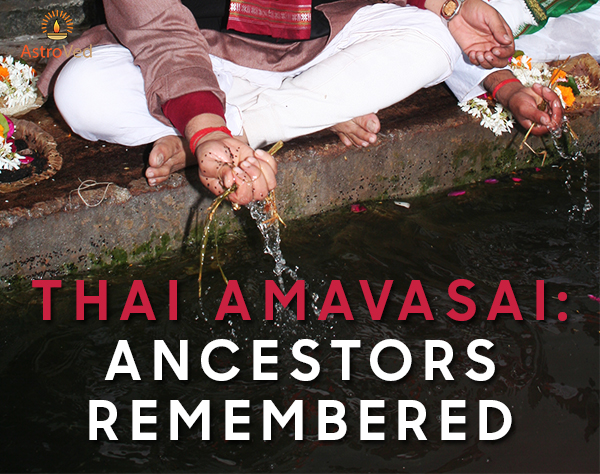Amavasai is synonymous with ancestral worship. Also called as Amavasya, it denotes the Moon phase of Amavasai thithi, and remains as the New Moon day of the month.
Thai Amavasai
The Tamil month ‘Thai’ is the period that beings in hope, auspiciousness, promise, and prosperity. In the English calendar, this corresponds to the middle of January to mid-February. Apart from being the harvest time that rings in plenty and joy to the people, especially the farmers, Thai has its religious significance too. The birth of the month also signals the beginning of Uttarayan, the time when the Sun, finishing its southward journey, turns towards the northern direction. This Uttarayan is highly auspicious, and this is borne out by the fact that Bhishma, the legendary warrior of Mahabharatha in his death bed, waited only for its advent for shedding his mortal coil.

The first day of Thai and also that of Uttarayan is observed as Makar Shankaranthi all over the country when people take holy baths in sacred rivers and oceans and perform worships and austerities. Thai month also marks the harvest time, and its birth is celebrated as harvest festivals in many states and regions of the country. Pongal, the grand harvest festival of the Tamils, is also celebrated on that day.
Thai Amavasai happens to be the first Amavasai of both the auspicious Thai and the sacred Uttarayan! Thus, Thai Amavasai turns out to be the extremely holy day of the highly promising month coming during the sacred period of the year!
No wonder this day is held as most suitable for remembering the forbears and offering prayers to them. In the current year, Thai Amavasai 2020 occurs on 24th January.
Ancestral Worship
The scriptures assert that once the soul leaves the body on the death of a person, it travels to a separate world where it stays for a particular duration of time before assuming a new physical frame and starting a new life. These ancestral souls are known as ‘Pitrus.’ On occasions like Thai Amavasai, they visit their children and descendants on earth in their subtle forms, to know about their wellbeing. Hence the holy texts and our ancients had insisted that on such occasions, we remember our ancestors with gratitude for all that they had done when they were alive, and offer them our respectful worship by performing the specified rituals. The pleased forefathers can then give their blessings to us, and this will ensure our wellbeing.
Thai Amavasai Pooja
The ancestral worship on that day, also known as the Thai Amavasai Pooja involves austerities, rituals, and prayers, dedicated principally to the departed forefathers. Scriptures have laid down specific guidelines for their performance, and these are called Thai Amavasai Pooja Vidhi. Thai Amavasai Pooja Katha also forms part of these ceremonial worships. Katha is a story, and this Thai Amavasai Pooja Katha covers many aspects of the worship like its necessity, puranic significance, benefits, etc.
Tharpanam is perhaps the crucial worship-ritual prescribed in the scriptures and the Thai Amavasai Pooja Vidhi. Tarpanam involves the ceremonial offering of oblations like rice, sesame seeds, and water to the departed souls, made in the background of mantra chanting.
As it is considered especially sacred to perform the ancestral worships in holy places, seashores, or on the banks of rivers or water bodies, many people go to such places for doing the rituals. Haridwar and Triveni Sangam in Allahabad in the north, and Rameswaram, Tiruppullani, and Kanyakumari in the South are some such sacred spots. At the same time, austerities are performed on the banks of sacred rivers like Ganges and Kaveri, too. People take holy dips in the waters, offer prayers to their forefathers, and perform Tharpanam guided by the pandits. Some also do other ceremonies like the Tila Homam, Pinda Daanam, etc.
Thai Amavasai Pooja can get for us the grace the departed family elders and help us to get relieved of our sins and enjoy good health, wealth, prosperity, longevity, and family and children welfare.
So, people may worship their forefathers on Thai Amavasai 2020 and receive their as well as divine blessings.